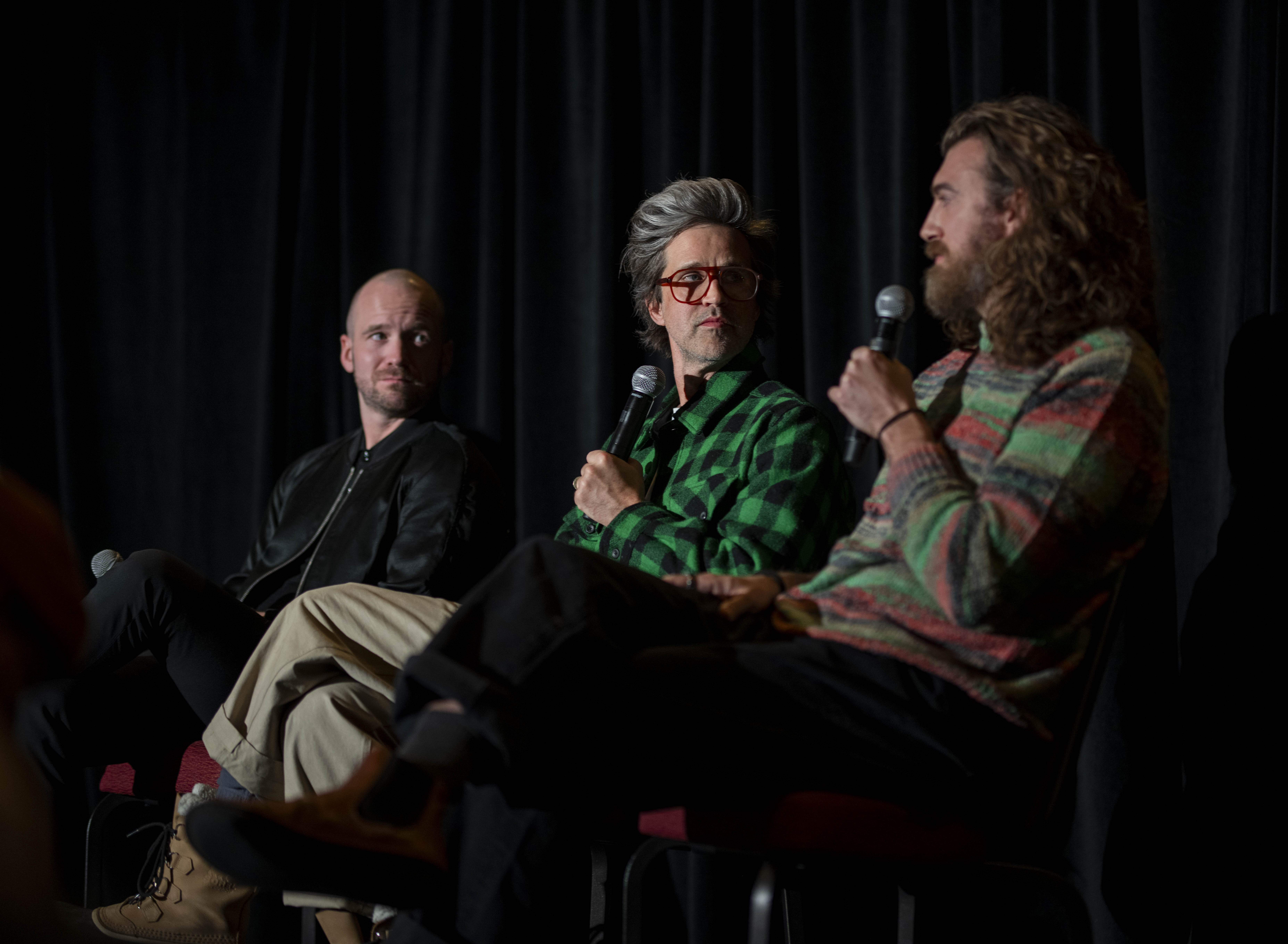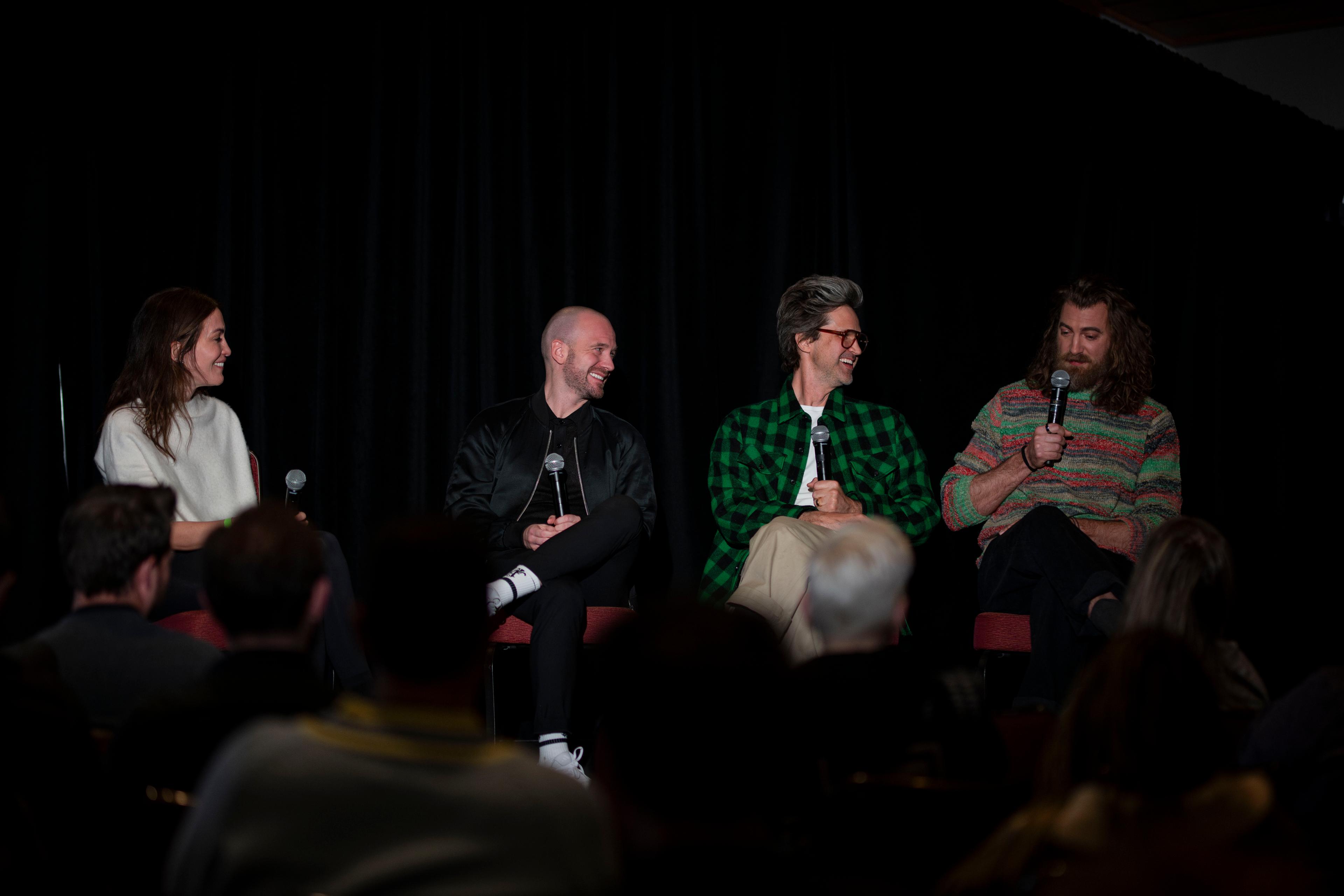Sundance 2025: In Creator Day fireside chat, viral YouTubers discuss origins, industry changes
Antonia Blyth moderates a panel with Sean Evans, Link Neal and Rhett McLaughlin. The discussion was part of BrandStorytelling’s inaugural Creator Day. (left to right) (Zimo Li/Photo editor)
By Victoria Munck
Jan. 30, 2025 2:49 p.m.
YouTube’s top creators are expanding the small screen – let’s talk about that.
Saturday, industry organization BrandStorytelling hosted its inaugural Creator Day, a sanctioned event of the 2025 Sundance Film Festival as part of its 11-day run in Park City, Utah. After multiple panels centered around the economics and evolution of content creation, the event’s grand finale was a fireside chat with internet stars Sean Evans, Rhett McLaughlin and Link Neal. The discussion, moderated by writer Antonia Blyth, outlined their keys to success as both creators and heads of their own media companies in an increasingly competitive and ever-changing industry.
Before launching the conversation, Blyth directed audience members to a video compiling some of the most viral moments from the panelists’ respective YouTube channels, First We Feast and Good Mythical Morning. McLaughlin and Neal run GMM – with over 19 million subscribers – under their entertainment company Mythical, which secured a streaming deal with Samsung TV Plus in November. Meanwhile, Evans, who hosts the popular “Hot Ones” interview show on the First We Feast channel, took the company independent alongside investors in a $82.5 million sale last month. When asked about the big decision, Evans said he and his team believed the show could only thrive once separated from the digital media industry it was created in.
“I wouldn’t change anything about the journey and all that it took to get here, and I think that there was a lot of positives in the way we started out,” Evans said. “But there was a lot of times where we thought we could use a little more sunlight here, a little more water here, in order to blossom.”
Rewinding to a time before their immense success, Blyth asked the panelists about the origins of their content creation. Evans said he and co-creator Chris Schonberger were working for Complex magazine when tasked with developing ideas for a YouTube show. After landing on the seemingly bizarre concept of “Hot Ones,” in which celebrity guests eat increasingly spicy wings, he and Schonberger never stopped producing episodes together, he added. McLaughlin and Neal, who have been friends since elementary school, similarly landed on food competition content after first trying more conversation-based episodes, McLaughlin said.
Reflecting on the draw of food-centric videos, Evans said the inclusion of hot wings disrupts the expected format of traditional interviews, entertaining both guests and audiences. Neal expanded on the point by acknowledging that eating is a relatable, core part of the human experience that also appeals to the platform’s algorithm. While he and McLaughlin trust that their relationship will get viewers to stay, they still recognize the need to earn their initial clicks, he added.
“We don’t want to become just subjects to the whims of the audience, because they’ll chew you up and spit you out,” McLaughlin said. “But you want to take into account, just be one step ahead of them and create the thing they’re about to start liking. That’s sort of our philosophy.”

Blyth continued by highlighting the panelists’ disruption of the modern television industry, noting Mythical’s recent streaming deal and “Hot Ones’” Emmys talk series qualification. Evans said he feels as though YouTube is currently being bridged with the industry, as it can now be accessed just as easily on a smart TV. Citing David Letterman and Conan O’Brien as major influences, he said he feels “Hot Ones” is worthy of comparison to their traditional shows in terms of its views and recognition in culture. While the consumer patterns might be changing, the escapism of a 30-minute time slot will always serve a purpose, he said.
“Trends can change, things can happen, but people rolling up with a blanket on the couch and watching something that invites the next episode in a binge but isn’t that great of a commitment – I think that’s timeless,” Evans said. “The classics and the behaviors of the people and what they’re looking for, it’s not that different from what I was looking for when I was a kid.”
McLaughlin went on to note that there are no longer many apparent aesthetic differences between television shows and the panelists’ YouTube content. Instead, he said the biggest contrast lies in the content’s level of connection. GMM intentionally places their camera at a distance that makes the viewer feel like they’re seated directly across from the hosts, he said, inviting them into their friendship in a way traditional media doesn’t.
The panelists also discussed the role brand partnerships have played in their production value and overall rise to success. Neal looked back on the channel’s early days, when he and McLaughlin wrote their own sponsorship contracts, saying they encouraged their audience to celebrate advertisements from the very beginning. McLaughlin added that he and Neal consider their content to be empowered by brands and ensure they aren’t viewed as intrusive.
To round out the discussion, the trio shared advice for people hoping to make a similar impact in the industry. While Neal joked with an optimistic song about pursuing dreams, Evans and McLaughlin shared their realistic conclusions. McLaughlin said YouTube isn’t the right job for someone solely interested in being beloved, as they will quickly learn that many people don’t like them. Similarly, Evans added that work in the field can often be discouraging. Content creation is best fit for people who can accept this and still be compelled by passion beyond it, he concluded.
“Unless you’re sick in the head and need to do this, just get a normal job, because it will make you miserable. You are exposed, and creative work can oftentimes be embarrassing and vulnerable,” Evans said. “If you don’t believe in what you’re doing and don’t believe in yourself, … that’s just going to make you miserable.”
